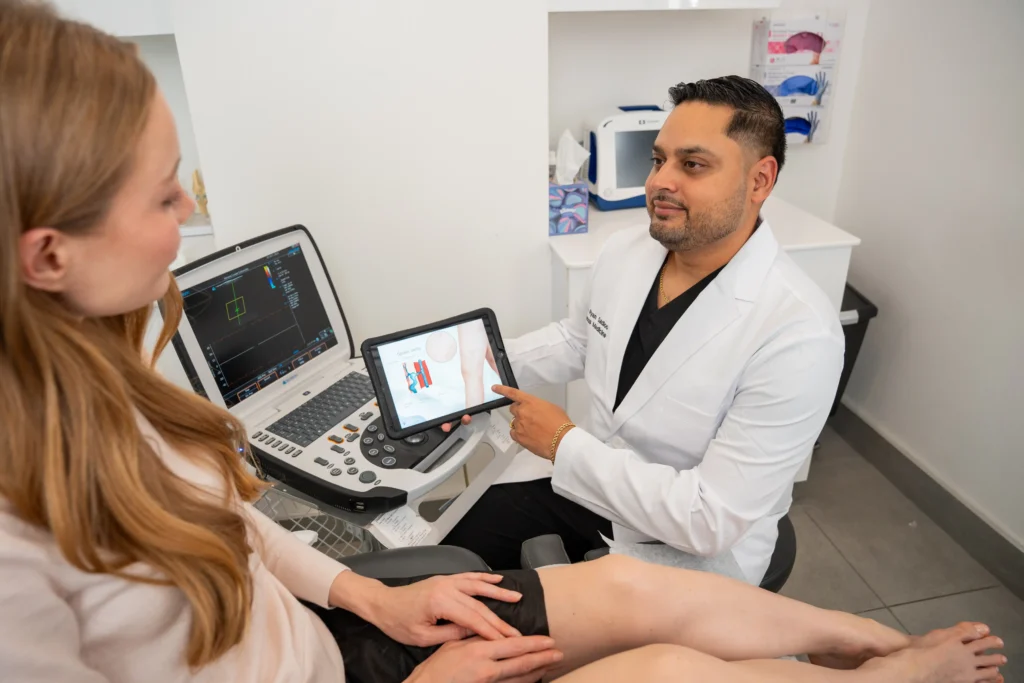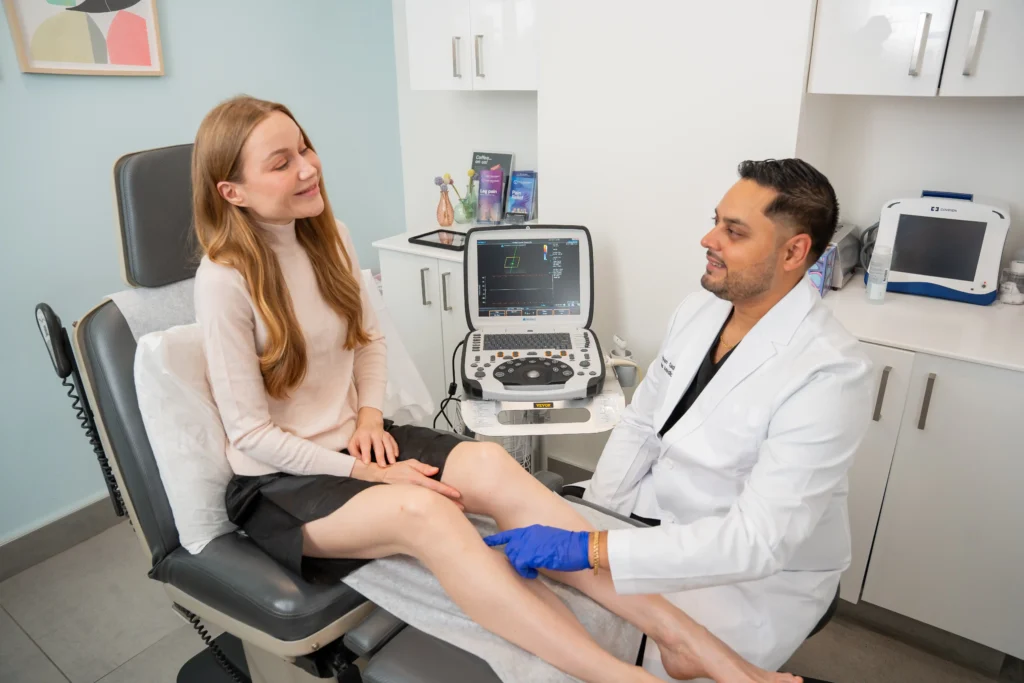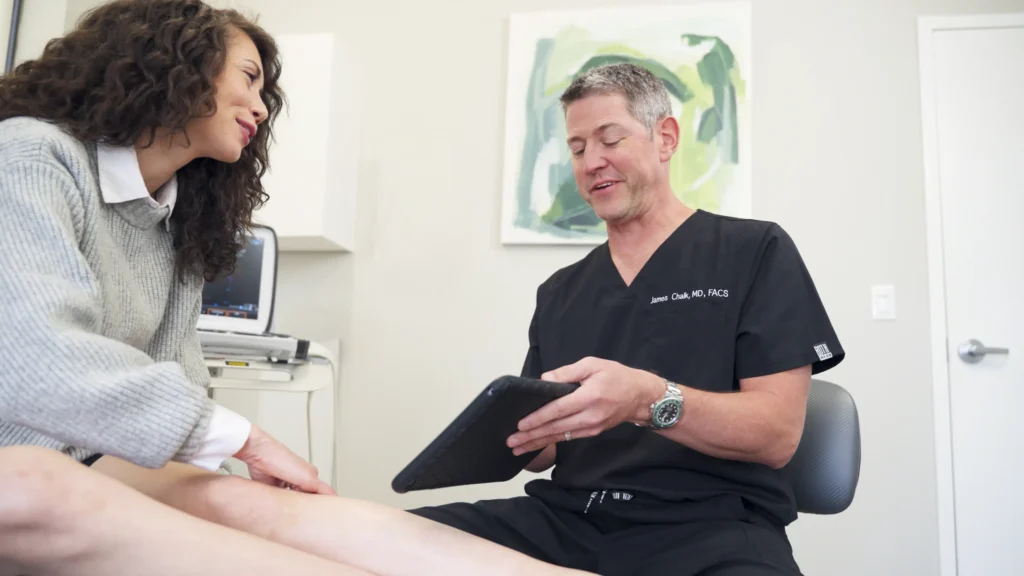Is the Vein Ablation Procedure Painful? Find Out Now!
You’ve been avoiding shorts and skirts for years because of unsightly varicose veins. They’re not just a cosmetic issue—they often come with discomfort, heaviness, and even pain in your legs. You’ve tried home remedies, compression stockings, and lifestyle changes, but nothing seems to provide lasting relief. You’re considering professional vein treatment but have one pressing concern: Is the vein ablation procedure painful?
At VIP Medical Group, we understand your concerns and are here to provide answers. Vein ablation is a minimally invasive procedure that addresses the root cause of varicose veins—chronic venous insufficiency. In this article, we’ll explain everything you need to know about the vein ablation procedure, what it feels like, how to minimize discomfort, and its many benefits.
What Is the Vein Ablation Procedure?
Vein ablation is a minimally invasive vein treatment that closes damaged veins that cause varicose veins. It works by using heat to seal the vein, rerouting blood flow to healthier veins. This not only relieves symptoms like pain and swelling but also improves the appearance of your legs. There are two primary methods of vein ablation: endovenous laser ablation and radiofrequency ablation.
Endovenous Laser Ablation
Endovenous laser ablation (EVLA) uses laser energy to treat venous insufficiency. During the procedure, your vein doctor inserts a thin catheter into the affected vein under ultrasound guidance. A laser fiber delivers targeted heat to the vein walls, causing them to collapse and seal shut. This redirects blood flow to healthier veins. The entire procedure is performed under local anesthesia, ensuring you remain comfortable.
Radiofrequency Ablation
Radiofrequency ablation (RFA) works similarly to EVLA but uses radiofrequency energy instead of laser heat. A catheter is inserted into the vein, and radiofrequency waves heat the vein walls, causing them to close. The procedure is also performed under local anesthesia and is highly effective in treating venous insufficiency. Like EVLA, RFA is minimally invasive, with little to no downtime required, and causes minimal discomfort.
Is the Vein Ablation Procedure Painful?
One of the most common questions patients ask is whether the vein ablation procedure is painful. The answer? Most patients report little to no pain during or after the procedure. Here’s a breakdown of what you can expect:
During the Procedure
Before the vein ablation procedure begins, your vein doctor will mark the affected veins using ultrasound imaging. This ensures precise targeting and minimizes the impact on surrounding tissue. A local anesthetic will then be administered to numb the treatment area completely, so you won’t feel pain during the procedure. The anesthetic injection may cause a brief pinching or burning sensation, but this is short-lived.
Once the area is numb, a small incision is made to insert the catheter into the damaged vein. Patients typically describe feeling mild pressure or pulling as the catheter is guided into place under ultrasound guidance. If you’re undergoing endovenous laser ablation, you may feel a slight warmth or tingling as the laser energy is applied. Similarly, during radiofrequency ablation, you might experience a gentle heating sensation.
After the Procedure
Immediately after the procedure, you can walk and resume light activities. However, it’s normal to experience mild soreness or tightness in the treated areas. Some patients notice slight bruising or a pulling sensation along the path of the vein, which is a sign of the vein closing effectively. These sensations are usually mild and temporary.
To manage discomfort, over-the-counter pain relievers such as acetaminophen or ibuprofen are typically sufficient. Your vein doctor may recommend wearing compression stockings for a few days to reduce swelling, improve circulation, and support healing. Most patients find that any post-treatment symptoms subside within a week, with significant improvement in symptoms like heaviness, swelling, or leg pain soon after.
Techniques to Minimize Discomfort
Ultrasound Guidance
Real-time ultrasound imaging is an integral part of vein ablation. This advanced imaging technique allows your vein doctor to visualize the vein, ensuring precise catheter placement and minimizing unnecessary trauma to surrounding tissues. Accurate targeting reduces discomfort during and after the procedure, making the treatment safer and more effective.
Compression Stockings
After the procedure, you’ll likely be advised to wear medical-grade compression stockings. These stockings apply gentle pressure to the legs, helping to reduce swelling, minimize bruising, and promote blood flow. Compression therapy also decreases the likelihood of developing blood clots, a rare but potential complication, while supporting the treated veins.
Post-Treatment Care
Your vein doctor may recommend specific aftercare practices. Applying cold compresses to the treated area can alleviate swelling and soothe any residual soreness. Elevating your legs while resting also promotes proper circulation and reduces inflammation. Additionally, light walking shortly after the procedure helps stimulate blood flow and accelerates healing.
FAQs
What causes varicose veins, and how does vein ablation help?
Varicose veins causes include chronic venous insufficiency, pregnancy, prolonged standing, and genetics. Vein ablation treats the underlying issue—venous insufficiency—by closing damaged veins and rerouting blood flow to healthier ones.
How long does it take to recover from the vein ablation procedure?
Most patients recover within a day or two, with only mild bruising or soreness. You can resume normal activities almost immediately after treatment.
Is vein ablation the best treatment for varicose veins?
For many patients, yes. Vein ablation is highly effective, minimally invasive, and has a quick recovery time, making it a top choice among vein treatment options.
Will my insurance cover the procedure?
If your varicose veins are causing medical issues like pain or swelling, the procedure is typically covered by insurance. While spider veins are often considered cosmetic, treating the root cause—venous insufficiency—is usually covered. Contact us to request free insurance verification.
Where can I find a vein center near me?
VIP Medical Group offers state-of-the-art vein clinics in New York, California, Maryland, and New Jersey. Learn about our vein clinics, or contact us to schedule a consultation to find the nearest vein treatment clinic and explore your vein treatment options.




